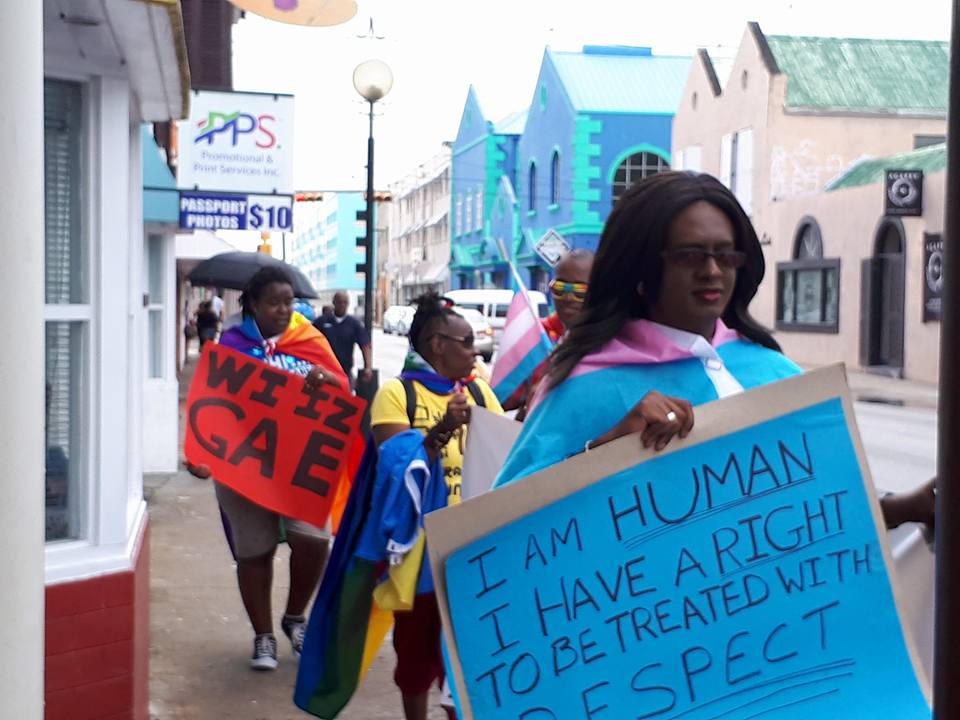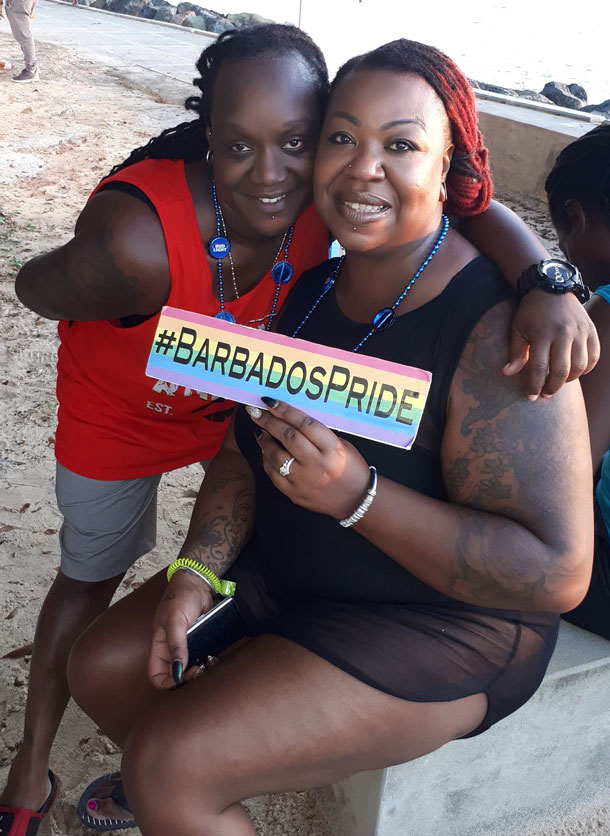Barbados Pride combats nation's anti-LGBT hatred
Colin Stewart is a 45-year journalism veteran. He is the…

Last weekend’s Barbados Pride was a time for LGBT Barbadians to join together to reject imported anti-LGBT religious rhetoric and growing anti-LGBT violence, homophobia and transphobia, writes Barbadian trans activist Alexa D.V. Hoffmann.
By Alexa D. V. Hoffmann
Barbados has the worst anti-sodomy law in the Western Hemisphere — life imprisonment — but we have not yet recorded the level of homophobic violence common in other Caribbean countries.
That said, we have seen a startling increase in the level of anti-gay rhetoric and organizing by Global-North-influenced religious groups. Their tactics have included blatantly homophobic conferences, street marches, and public fora that vilify and demonize the LGBT community. Our politicians have also jumped on the anti-LGBT bandwagon with dog whistle “morality” campaigns to distract from our economy’s poor performance, due in part to Brexit.
In response to this rising tide of hate, LGBT Barbadians held our first official LGBT Pride from Nov. 24 to 26. This was our second attempt at organizing Pride, as the ambitious 2015 version largely fizzled due to community challenges and fear. This time around, a smaller group of us with support from the Canadian HIV/AIDS Legal Network decided on a focused and ultimately more successful programme.

Barbados Pride featured a weekend of events, including the first-ever public Walk for LGBT Rights in the English-speaking Caribbean and the first-ever Memorial Stand for Transgender Day of Remembrance (TDoR) in Barbados. We also held activities to showcase the multifaceted LGBT community, such as an expo for LGBT-owned businesses, a talent show, and a film screening of the fight against the dreadful Anti-Homosexuality Act in Uganda, which is in many ways similar to our own draconian statute.
The High Commission of Canada in Barbados agreed to host our launch event, which we felt was fitting in light of the fact that Canada co-chairs the U.N. Equal Rights Coalition. This coalition of states is seeking to advance the human rights of LGBT people globally. Canada and Barbados also share a similar history as former British colonies, where our anti-sodomy laws originated. While Canada managed to jettison its law nearly 50 years ago, in our 51st year of independence Barbados ironically clings to this colonial imposition as a sign of our sovereignty.
For years, many Barbadians have argued that LGBT Pride was a concept too radical for our society to handle. Some LGBT advocates were also against the idea for fear of backlash, as hate-mongering campaigns by religious fundamentalists and anti-gay figures claimed that a Barbadian Pride celebration would mimic the “moral decadence of the West.” I had often been told that such an endeavour as Barbados Pride would only be asking for trouble, but I refused to heed such misgivings, because I knew how important Pride was for our LGBT community, especially for me as a transgender woman.
I was privileged to deliver a talk at the Pride launch. I recounted how the original catalyst to Pride celebrations globally, the Stonewall riot against police abuse and state indifference, remains an integral part of LGBT advocacy. I also impressed upon those present, which included senior civil servants, representatives of diplomatic missions in Barbados and the media, why such advocacy was needed here. While no member of the Barbadian government accepted our invitation to attend the launch (testifying to their antipathy towards the LGBT community) I shared how our government ignoring and treating us as undeserving of dignity, respect and legislative protection — coupled with extremist religious dogma and an increasingly hostile pop culture — inevitably resulted in us pushing back against this onslaught of neglect and abuse.
As an openly transgender woman seeking to live my life as part of mainstream society and not as a segregated minority character and caricature, my exasperation boiled over when I read that every year at least 200 transgender persons globally, mostly women, were killed as a result of transphobic violence; and how this year alone, 325 trans persons from as young as 15 years old were slaughtered simply for existing. There have been over 2,600 trans deaths worldwide over the last 9 years, with more than 2,000 of them occurring in Central and South America as well as neighbouring countries (i.e. our Caribbean region). [Editor’s note: Some of them are listed in the article “1000s who died in anti-gay, anti-trans attacks.”]

My exasperation boiled over when I read of how many right-wing evangelical ministers came into Barbados to spread deliberate and gross misinformation about the LGBT community; about their claims that, despite my being a non-violent, law-abiding gainfully employed citizen of Barbados, I am somehow “mentally diseased,” “demonic” and a danger to society.
My exasperation boiled over when I learned how many LGBT persons, after being harassed and even attacked, received little to no assistance from the local police. In my own case police largely ignored my report after a mob threw stones and glass bottles at me outside a mini-mart in 2016.
My exasperation boiled over when I heard many people in Barbados assert that the LGBT community was either making false complaints or making mountains out of mole hills when it was reported by local advocates and foreign entities that several Barbadian LGBT persons have sought asylum overseas. LGBT people are fleeing Barbados in droves because they no longer feel safe in our homeland, which is beginning to mimic the homo- and transphobic attitudes of Jamaica with “murder music” playing on public transportation and in public spaces. We are also seeing an increase in threats of violence against LGBT people by average citizens with no government interventions.
Some persons have repeatedly said that Barbados is tolerant of LGBT people because “whenever gay tourists come here they are welcomed.” But local LGBT people do not receive such preferential treatment. For example, at our annual Kadooment festival in 2013, a gay person carrying a flag was assaulted by bystanders because he dared to make himself visible. A gay man was also hospitalised earlier this year with stab wounds, inflicted because of his unabashed personality and flamboyance.
Barbados is steadily reaching a level of homophobia and transphobia which mirrors the extreme violence seen in some southern U.S. states. This is not surprising since much of the anti-gay rhetoric we are witnessing originates from those same areas.
As a result of this sad societal change and the threat of backlash in terms of loss of employment, home evictions and worse, some LGBT Barbadians are choosing not to associate with other members of the community or even be seen with us. Others choose simply not to make themselves known to anyone at all. This is at a time when we need more visibility from the LGBT community to counteract the lies being spread about us by religious extremists. Research has also identified that LGBT people are also hesitant to seek HIV and other health interventions, which threatens our country’s public health efforts.
We can hardly blame those community members who are retreating into the shadows in light of the increasing threats to their livelihood and well-being. As seen the world over, unchecked hate speech can quickly transform a tolerant society into one where anti-LGBT violence is commonplace. This is especially true in micro-states like Barbados where such utterances by influential persons carry greater weight than elsewhere.
Statements by local right-wing religious extremists have therefore fanned the flames of intolerance that threatens to consume Barbados. For example, university lecturer and sociologist Dr. Veronica Evelyn has called homosexuality “illogical” and a threat to the Barbadian family. Similarly, Dr. Lucille Baird gave a deliberate and grossly deceitful presentation about how the LGBT community advocates making everyone else gay and “perpetuates the myth of heterosexual AIDS.” Reverend Marcus Lashley also sought to correlate homosexuality to pedophilia and pederasty.
As a result, Barbados is rapidly being transformed from a society where a person’s sexuality was largely irrelevant to one where the violently homophobic epithets “Bun fiyah!” (burn gays) and “Boom!” (mimicking the sound of shooting gays) are being heard more frequently on the streets. It will only be a short time before there are increased reports of anti-LGBT physical violence, including murder, as citizens start acting on the homophobic sentiments being deliberately whipped up.
This impending threat was why a group of us decided to organise Barbados Pride — to halt and reverse the coming homophobic storm. We intended for Barbados Pride to be not just a statement of the LGBT community’s refusal to feel shame for who we are, but to also become a safe space where persons could unite and find support with like individuals and allies. We we also wanted to prove that Pride organizing was not far out of the reach of our abilities as local advocates.
When we asked the Canadian High Commission to assist us, we meant to show our government how a proper, diligent government which strives to look out for the interest of human beings should act when met with a marginalised group. When we walked through the capital of Bridgetown bearing placards, wearing rainbow and trans Pride flags as capes and carrying the Barbados Pride banner, we were making a statement to the public that we would not allow the descent into rampant homophobia and transphobia to continue any further, and that we were going to use the power our existence and resilience to fight back with all our might against it. And when we stood across the road from the façade of the Parliament grounds, flying our Trans Pride flags and the Barbados flag, we reminded our country that we were born and bred “Bajans” with full validity as citizens. We would not allow ourselves to be picked off like “Banks” beer bottles on a wall.
Barbadian LGBT people are taking steps to ensure the full enjoyment of our human rights. Barbados Pride is testimony to this fact. In the face of government apathy, Pride reminds our Barbarian family of our celebrated history of tolerance as we seek to reject imported religious rhetoric with its alien legacy of hate.
Alexa D. V. Hoffmann is a Barbadian trans advocate focused on breaking stereotypes and social limitations imposed upon trans persons in Barbados. Alexa is the founding director of Trans Advocacy & Agitation Barbados (TAAB) and a member of the Latin American and Caribbean Network of Trans Persons (RedLacTrans).
Related articles:
- In Barbados, anti-gay march ends in mini-Pride Parade (October 2017, 76crimes.com)
- Barbados training: Police learn about LGBTI community (March 2017, 76crimes.com)
- Barbados protests seek repeal of harsh buggery law (August 2015, 76crimes.com)
- Will tourist-dependent Barbados risk staying anti-gay?
- Caribbean youths seek repeal of 6 nations’ anti-gay laws
- Queen honors LGBTI leader seeking change in Barbados
- Progress in Barbados despite harsh anti-gay law
- Barbados: No plan to drop life sentence for anti-sodomy law




